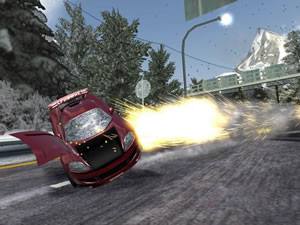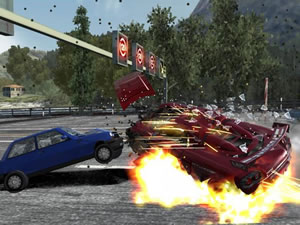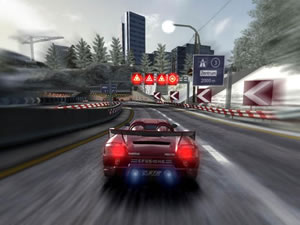The real need for speed.
Like any racing fan worth his weight in oil, I have a sweet tooth for crashes,
pile-ups and mangled steel. Realism is all well and good, but not when it comes
at the expense of action. All the car-tuning and customizing in the world can’t
save a crashless racer from being a few insurance quotes shy of a worthy spot
in my collection.
Criterion Games, the developer behind EA’s new Burnout
3: Takedown, apparently agrees with me wholeheartedly – their game happens
to be one the most thrilling, pulse-pounding racers I have ever played. Though
there are a few notable bumps in the road, they don’t keep this one from racing
to the top of my must-have list.
Burnout
3 is
a very thorough racer, featuring 40 tracks, 17 different game modes and 67 vehicles,
though not everything is available right from the start. Much like Tony
Hawk, the game requires you to win medals and races and take plenty
of risks to unlock vehicles and events around the world.
Unlike most other racers, though, safety can actually get you into a heap
of trouble in Burnout
3, as the game rewards you for being a royal pain behind the wheel
by increasing your ‘Boost’ meter when you perform reckless moves. Driving
on the wrong side of the road, just barely missing traffic, drifting around
corners and catching air all lead to nice Boost gains, but what really maxes
out your meter is causing your opponents to crash (the ‘Takedown’ part
of the title). You can string moves together as well – combining a little
fender rubbing, shunting, and tailgating is heartily encouraged.
But don’t think this road rage is exclusive to you. The more aggressive you
drive, the more irritated other cars get. The result is a pack of pissed-off
digital speed demons bent on watching you in their rear view mirror tumbling
end over end in a hail of splintered steel.
And you’ll pick out each and every splinter if you choose to use Burnout
3‘s sweet “Aftertouch” feature. During any crash sequence, holding
down a single button throws the game into a Max
Payne-esque slow-mo and allows you to minutely guide your car with
the D-pad or analog sticks. If you hit another car during an Aftertouch, you’ll
rack up oodles of points, especially if the car is one of your five competitors.
This also helps multiply your boost and makes the whole wipeout experience
a functional boon instead of the traditional bust.
The meat meets the metal in the game’s World Tour campaign, in which you compete
in over 150 events, from not-so-simple Time Trials to six-car Single races and
Grand Prix events. There are a plethora of race types to enjoy, including cool
variants like Road Rage (take down as many cars as possible in a certain amount
of time) and Lap Eliminator (after each lap, the guy in last place is eliminated).
 You’ll face some of the game’s most thrilling challenges in the Crash events.
You’ll face some of the game’s most thrilling challenges in the Crash events.
Here you speed through an intersection to produce the biggest pile-up and
most spectacular crash possible. Points are tallied for the amount of damage
caused; the trick is to find the most advantageous path to destruction. In
a new twist, you can actually blow up your own car at any point, effectively
turning your ride into a bomb. It’s
terrific fun and holds up well over time; long after you’ve claimed the gold,
you’ll return
to cause more chaos.
Perhaps the brightest feather in Burnout 3‘s crowded cap is
its blinding sense of speed. From the very first race, the speed is exhilarating.
You careen through traffic as if shot out of a cannon, giving the gameplay a
rare kind of urgency and intensity. And as you unlock different vehicle classes
(compacts, muscle cars, sporty cars, etc.), the speed becomes more hazardous,
challenging and exciting.
Aesthetically, it all comes together quite well. The particle system is just
jaw-dropping – sparks fly as you scrape against walls, railings and other vehicles
– and the damage modeling is unmatched. Vehicles literally shatter in all sorts
of realistic ways, raining shrapnel, ripped doors and broken glass all over
the raceway. The chaos factor is on tilt in this one.
The cars themselves, however, aren’t the most detailed rides on the digital road.
Some gloss and sheen help out a bit in both versions (the Xbox version is much
cleaner and smoother overall), but compared to other racing games, the vehicles
are somewhat bland. The PS2 version suffers from some strange gamma issues as
well as noticeably longer load times, though neither console shows any hiccups
or slowdown. The framerate is consistent and silky-smooth throughout.
 Another flat tire is the gross omission of any manual replay feature. This game
Another flat tire is the gross omission of any manual replay feature. This game
is such a feast for the senses, you’ll really want to watch an entire race
from start to finish using all the standard replay features like multiple vantage
points, rewind and slow motion. Sadly, this plea is left for the inevitable Burnout
4.
While
the game sounds fine, the music lacks any decent variety. It might be a sign
of the times or a sign of my age, but I’m just not into contemporary alternative
pop rock. Luckily, Xbox owners can import their own music via the Xbox hard drive;
PS2 owners will have to grin and bear it or mute it.
Racing game purists will also dislike the lack of any sort of vehicle customization,
the paltry choice of three colors and the lack of alternate track routes, but
these are hardly deal breakers when you consider the sheer number of modes
and consistently exciting gameplay.
And long before you complete the single player modes, you’ll want to take this
puppy online via Xbox Live or the PS2 online adapter. Up to six players can play
any of the modes with up to eight players taking turns in the Crash
events. The connection on both systems is very solid. Players with high pings
or poor connections will warp around the track and annoy you a bit, but that’s
fairly standard for a racing game.
Burnout 3, however, is anything but standard. With outstanding
physics, an unmatched sense of speed and a wealth of game types, it easily
blows the doors off the competition. And that’s all the realism I need.
-
Very fun
-
Incredible sense of speed
-
Unmatched damage system
-
A wealth of game types & events
-
Solid graphics
-
Horrible music...
-
...so use your own!
-
No replays?
-
No customization







